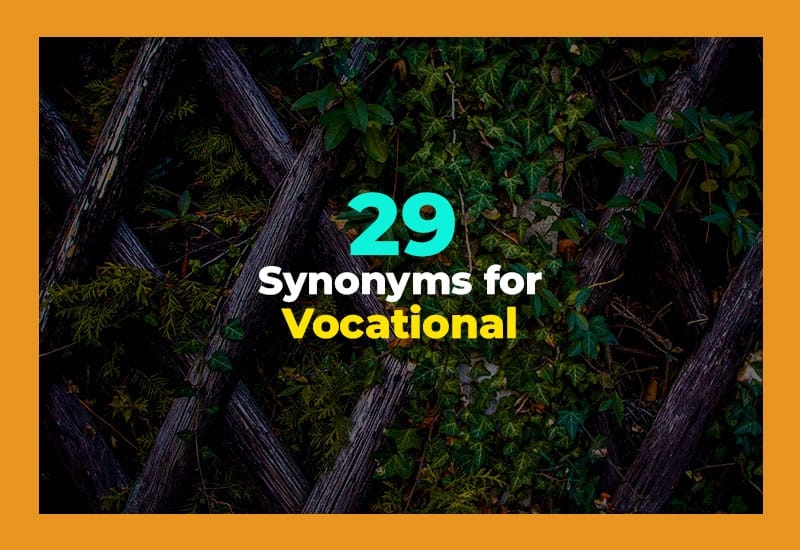Sometimes learning about jobs and skills can feel a bit harsh, almost like a sour or sharp taste in your mouth. But don’t worry, we are going to make it fun and simple. Today we will explore 29 easy synonyms for “vocational” so you can sound smart and clear when talking about work, skills, and careers.
1. Occupational
Occupational means related to a person’s job or career. It focuses on the work someone does for a living. For example, “She took an occupational health course” or “His occupational training helped him get a better job”. This word is often used when talking about safety, health, or activities connected with work. It can be used for any kind of profession or employment role.
2. Professional
Professional means connected to a profession or skilled job. It can describe someone who is trained and qualified in their field. For example, “She is a professional chef” or “He joined a professional engineering group”. It is often used to show high standards and expertise in work. It can also mean behaving in a polite and skilled way at work.
3. Career-related
Career-related means connected to your job path or long-term work goals. It is used when something helps you grow in your career. For example, “He attended a career-related workshop” or “She made a career-related decision to change jobs”. This term is often used for training, activities, or decisions that directly improve your professional life and opportunities.
4. Job-related
Job-related means linked to a specific job or work activity. It often talks about skills, tasks, or problems connected with a person's role. For example, “He took a job-related safety course” or “The injury was job-related”. It can describe anything that comes from, affects, or is part of someone’s work duties or responsibilities in their employment.
5. Work-oriented
Work-oriented describes something focused on tasks, duties, or results at work. It can also describe a person who thinks a lot about their work. For example, “She is very work-oriented and meets every deadline” or “The meeting was work-oriented, focusing on project goals”. This phrase shows direction toward job results, efficiency, and achieving objectives in a work environment.
6. Trade-related
Trade-related means connected to a specific trade, like carpentry, plumbing, or mechanics. For example, “He completed a trade-related certificate” or “The policy affects trade-related industries”. It is often used when talking about skills that involve manual or technical work. This term can also be used in business to describe activities linked to buying and selling goods or services.
7. Skilled
Skilled means having the training and ability to do something well. It describes people with expertise in a certain area. For example, “She is a skilled electrician” or “He is skilled at repairing cars”. Skilled work often requires special education or hands-on practice. This word shows ability and competence, especially in tasks that require training or talent.
8. Technical
Technical means related to specialized knowledge, especially in science, engineering, or machines. For example, “He has strong technical skills in software” or “The job needs technical knowledge of electronics”. It is used for details or abilities that require precise understanding. Technical can also mean following strict rules or processes in work or problem-solving situations.
9. Practical
Practical means focused on real situations and useful actions rather than theory. For example, “She has practical experience in teaching” or “This course gives you practical skills”. It shows ability to do things effectively in real life. Practical learning often involves hands-on work or training that helps you use your skills in everyday jobs or problem-solving.
10. Employment-focused
Employment-focused means aimed at helping people get or keep jobs. For example, “The program is employment-focused, helping students prepare for work” or “They offer employment-focused training sessions”. It is used for activities, courses, or services that make people ready for the job market. It shows a direct link to improving someone’s ability to be hired.
11. Work-based
Work-based describes learning or activities that happen in a real work setting. For example, “He took part in a work-based training program” or “Work-based learning helps students gain experience”. It is common in education programs that include internships, apprenticeships, or on-the-job training. This term shows the connection between study and actual workplace practice.
12. Industry-based
Industry-based means related to a specific business sector or field. For example, “They offer industry-based training for healthcare workers” or “This is an industry-based standard”. It is often used when talking about rules, skills, or methods that are common in a certain type of work. It connects learning and skills directly to the needs of a particular industry.
13. Hands-on
Hands-on means learning or doing by actually performing the task. For example, “He likes hands-on learning in workshops” or “Hands-on experience is important in nursing”. It focuses on real practice instead of just theory. This style of learning helps people remember skills better because they are actively involved in the work.
14. Labor-related
Labor-related means connected to work done by people, especially physical work. For example, “The law protects labor-related rights” or “They studied labor-related issues in factories”. It can also mean linked to workers’ unions or job conditions. This term is often used when talking about the human effort part of production or services.
15. Craft-related
Craft-related means linked to making things by hand with skill. For example, “He attended a craft-related workshop for pottery” or “The craft-related skills were passed down from his grandfather”. It usually refers to creative or skilled manual work like carpentry, weaving, or ceramics. This word connects work to artistry and personal touch.
16. Task-oriented
Task-oriented describes focusing on getting specific jobs done. For example, “She is very task-oriented and always meets deadlines” or “The manager is task-oriented during busy projects”. It shows a focus on completing assignments rather than on other factors like relationships or atmosphere. It often describes a working style that values productivity and clear results.
17. Applied
Applied means using ideas or skills in real situations. For example, “He studied applied mathematics for engineering” or “This is an applied approach to problem-solving”. In jobs, it refers to knowledge put into action. Applied skills are practical, useful, and often tested in real work situations rather than just studied in theory.
18. Job-focused
Job-focused means centered on a particular job or employment goal. For example, “The course is job-focused to prepare students for interviews” or “She joined a job-focused mentorship program”. This term is often used for training, workshops, or planning that is directly aimed at helping someone perform or get a certain type of work.
19. Career-focused
Career-focused means aiming toward long-term success in a career. For example, “He made career-focused choices in his education” or “Career-focused programs help workers grow”. This term often describes planning or learning that builds a professional future. It can be about gaining skills, networking, or making decisions that help with promotions and career growth.
20. Service-based
Service-based means centered on helping people or providing services. For example, “She runs a service-based business in cleaning” or “The service-based sector is growing fast”. It usually describes jobs where the main work is not making things but doing something for customers or clients. This can include hospitality, healthcare, education, and many more.
21. Workforce-related
Workforce-related means connected to people who are working or looking for work. For example, “They launched a workforce-related training plan” or “The report covers workforce-related issues”. It often talks about job trends, skills needed, or ways to support employees. This term can be used in business, government, or education.
22. Field-specific
Field-specific means related to a certain area of work or study. For example, “He learned field-specific medical terms” or “Field-specific training is needed for aviation jobs”. It shows that the knowledge or skills are narrow and specialized, focusing only on one industry or profession rather than being general.
23. Business-related
Business-related means connected to business activities or commerce. For example, “She took a business-related degree” or “We discussed business-related issues”. It can describe training, events, or topics that help in business growth, management, sales, or company operations. It is often used when talking about work skills in a corporate or trade setting.
24. Productivity-oriented
Productivity-oriented means aiming to get the most work done in the best way. For example, “The new plan is productivity-oriented” or “She has a productivity-oriented work style”. This term shows a focus on efficiency, output, and results. It is often used for strategies, habits, or methods that help people or companies work faster and smarter.
25. Workplace-based
Workplace-based means happening or centered in the place where people work. For example, “The course is workplace-based” or “He got workplace-based training”. It often talks about learning or projects that happen directly in the real job environment. This can help workers apply skills immediately while doing their daily tasks.
26. Position-related
Position-related means linked to a specific role or title in a job. For example, “She took position-related training for her promotion” or “These duties are position-related”. It is often used when talking about skills or responsibilities needed for a certain post. It shows the connection between the job title and the work done.
27. Functional
Functional means serving a purpose or working well for a task. For example, “He gave a functional solution to the problem” or “Her design is both beautiful and functional”. In jobs, it can describe skills or roles that are practical and effective. It focuses on usefulness and the ability to perform well in work situations.
28. Role-based
Role-based means tied to a specific position or responsibility. For example, “He has role-based duties in the project” or “The training is role-based for better results”. It shows that the work or skill is shaped by what the role requires. This is common in team jobs where different members have different tasks.
29. Enterprise-related
Enterprise-related means connected to a business or company, especially one that is large or formal. For example, “He joined an enterprise-related training program” or “The changes are enterprise-related”. It often talks about skills, rules, or systems that help a business operate. It can also relate to entrepreneurship or starting a new business.
Final Thoughts
Learning synonyms for vocational can make your writing and speaking about work much more colorful and clear. These words help you explain different parts of jobs, careers, and skills without always repeating the same word. Whether you are talking about training, industries, or work style, each term gives you a more exact meaning. Try using them in real conversations so they become a natural part of how you talk about work.

| Synonym | Meaning | Example |
|---|---|---|
| Occupational | Related to a job or career | She took an occupational health course. |
| Professional | Skilled and trained in a job | She is a professional chef. |
| Career-related | Linked to career growth | He attended a career-related workshop. |
| Job-related | Connected to a job’s tasks | The injury was job-related. |
| Work-oriented | Focused on work duties | She is very work-oriented. |
| Trade-related | Linked to a trade or manual skill | He completed a trade-related certificate. |
| Skilled | Having ability or training | She is a skilled electrician. |
| Technical | Related to specialized knowledge | He has strong technical skills. |
| Practical | Focused on real-world use | She has practical experience in teaching. |
| Employment-focused | Aimed at getting jobs | The program is employment-focused. |
| Work-based | Learning in a real job setting | He took part in a work-based program. |
| Industry-based | Linked to a business sector | They offer industry-based training. |
| Hands-on | Learning by doing | He likes hands-on learning. |
| Labor-related | Connected to physical work | They studied labor-related issues. |
| Craft-related | Linked to handmade skills | He attended a craft-related workshop. |
| Task-oriented | Focused on completing tasks | She is very task-oriented. |
| Applied | Used in real situations | He studied applied mathematics. |
| Job-focused | Centered on a certain job | The course is job-focused. |
| Career-focused | Aiming at career growth | He made career-focused choices. |
| Service-based | Centered on providing services | She runs a service-based business. |
| Workforce-related | Linked to workers or job seekers | They launched a workforce-related plan. |
| Field-specific | Focused on a certain field | He learned field-specific medical terms. |
| Business-related | Connected to business | She took a business-related degree. |
| Productivity-oriented | Focused on efficiency | The plan is productivity-oriented. |
| Workplace-based | Happening at the job site | The course is workplace-based. |
| Position-related | Linked to a job role | She took position-related training. |
| Functional | Serving a useful purpose | Her design is functional. |
| Role-based | Tied to a role’s duties | The training is role-based. |
| Enterprise-related | Linked to a business | He joined an enterprise-related program. |









